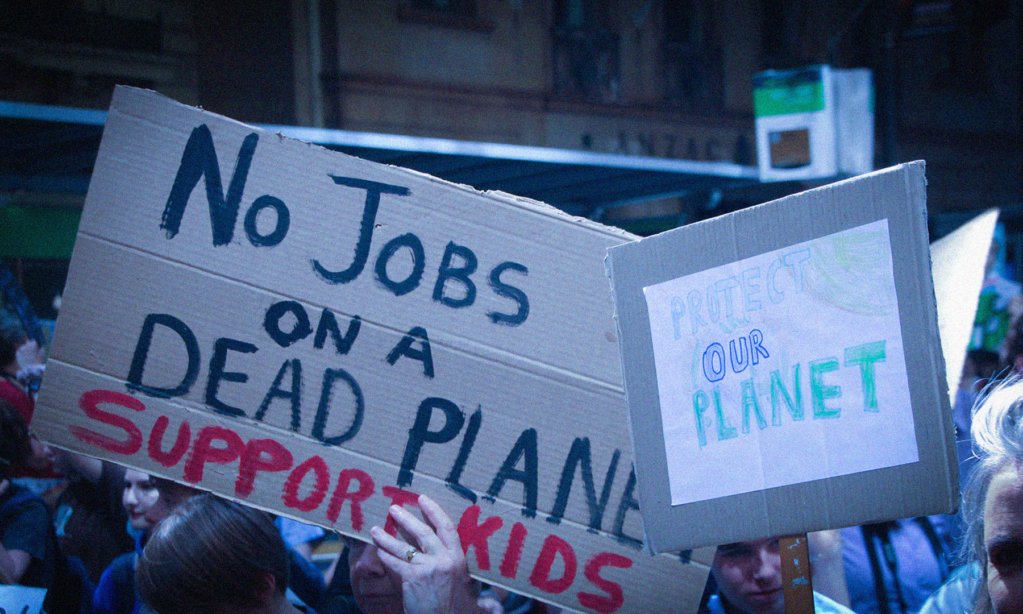The phrase “just transition” is in the news as the federal and Alberta governments spar over proposed legislation. At the CCPA we’ve written a lot about Just Transition over the years, so we’ve put together this backgrounder to help get you up to speed.
What is the latest Just Transition fight about?
In 2019, the federal Liberal election platform included a Just Transition Act, which was a promise reiterated in the mandate letters of a number of ministers. In 2021, the government finally began consultations on Just Transition legislation—we offered our recommendations here—and the draft legislation is expected to be tabled this year.
The latest debate began with the premier of Alberta claiming that the Liberals’ Just Transition plan “will eliminate 2.7 million jobs” based on a briefing note to Natural Resources Minister Jonathan Wilkinson. Wilkinson is one of a handful of federal ministers responsible for the just transition legislation, including Environment Minister Steven Guilbault.
We’ll address the premier’s claim in a moment, but first some context…
What is a Just Transition?
At its core, the idea of a Just Transition is about making sure that no one is left behind (that’s the “just” part) as the economy changes (that’s the “transition” part). Just Transition is often specifically focused on how to minimize the harm to workers and communities of the transition away from fossil fuels. Hundreds of thousands of workers in Canada depend on the coal, oil and gas industries for their livelihoods, so an unmanaged transition away from those fuels carries significant risks for them, their families and their communities. Many other industries, from agriculture to transportation, will also be affected by a shift to greener alternatives.
Where did a Just Transition come from?
Just Transition originated in and continues to be championed by the labour movement both domestically and internationally. These unions do not dispute the necessity of government policies to fight pollution or shift the economy toward greener industries, but they expect workers to be a part of the conversation and for their well-being to be prioritized. Workers should not be sacrificed in the name of climate change, especially when a just and managed transition is possible.
Who else is calling for a Just Transition?
In recent years, the Just Transition banner has been taken up by a variety of environmental and social justice movements. These groups also want to ensure justice in the transition to a cleaner economy, but they take a broader interpretation of who should be included in the Just Transition conversation. Indigenous Climate Action, for example, calls for a Just Transition that goes beyond the immediate rights of workers to encompass an agenda of inclusive social and economic change in Indigenous communities.
What does a Just Transition look like in practice?
Making a Just Transition a reality requires a mix of targeted social, labour and industrial policies, largely at the federal and provincial levels. Workers who are displaced by environmental policies can be supported with income supports, retraining and job transfers, among other programs. Communities can be supported with targeted public spending to diversify local economies and create new green jobs. Governments must also take an active role in labour market management, to ensure there are enough workers being trained for the jobs being created. Whether or not all these elements will be included in the federal government’s forthcoming legislation remains to be seen.
Crucially, any policy or investment should be designed in collaboration with the people who are impacted by it. Participation of affected workers and communities is a key tenet of a Just Transition.
Does Canada have Just Transition policies in place already?
The federal and some provincial governments have been talking about a Just Transition since 2015 and have implemented some policies under that banner. To date, Canadian Just Transition policies have mainly focused on the phase-out of coal power. For example, Alberta created a Coal Workforce Transition Program to support workers in that industry, in part due to pressure from the Alberta Federation of Labour. However, Canada has no overarching Just Transition policy or strategy beyond the existing social safety net.
Are other countries talking about a Just Transition?
The promise of a Just Transition has captured the attention of workers and governments around the world. Many countries are further ahead than Canada. For example, Scotland’s Just Transition Commission and New Zealand’s Just Transition Unit are helping those countries plan the transition away from fossil fuel production. Some countries, such as Denmark (cofounder of the Beyond Oil and Gas Alliance), have already made enormous strides toward a Just Transition away from fossil fuels.
So, is federal Just Transition legislation actually about eliminating millions of jobs?
In short, no. First of all, the latest outrage from the Alberta premier does not accurately reflect the contents of the briefing note in question. More importantly, though, the premise of a Just Transition is to ensure justice for workers and communities that undergo any sort of economic transition. Indeed, a Just Transition is about protecting workers and creating green jobs, not leaving workers behind.
What the premier is upset about is not the idea of Just Transition itself but the more basic premise of a transition away from fossil fuel production. Just Transition is being used as a synonym for climate action, which the premier rejects.
OK, but is climate action going to eliminate millions of jobs?
The transition away from fossil fuels, both on the production (supply) side and consumption (demand) side, is already having and will continue to have profound effects on the workforce. Millions of jobs will “churn” in the coming decades, to use a term from economics. That means many people will be shifting from one job to another, but not that the total number of jobs will shrink. In other words, while it’s technically true that millions of (dirtier) jobs may wind down, it’s also true that millions of (greener) jobs will be created.
This is precisely why Just Transition policies are so important. Governments need to help people—and the communities they live in—to move from one line of work to another. Governments also need to ensure the green jobs being created are good, desirable jobs.
What if Canada chooses not to transition in the first place?
Unfortunately (or, perhaps, fortunately), the coming green industrial revolution is largely outside our control. Among other issues, the world is going to stop buying Canadian oil whether or not we keep producing it. And as global industrial supply chains, such as auto manufacturing, transition toward greener alternatives, Canadian industry will be left behind if we don’t follow suit.
The choice before us, then, is not whether we keep making and burning fossil fuels. The choice is whether we stumble through an unmanaged and unjust transition—one where workers and communities bear the brunt of the coming changes—or whether we pursue a proactive, managed and just transition to a cleaner economy. A Just Transition offers a path to a more prosperous, inclusive and sustainable future for all.







